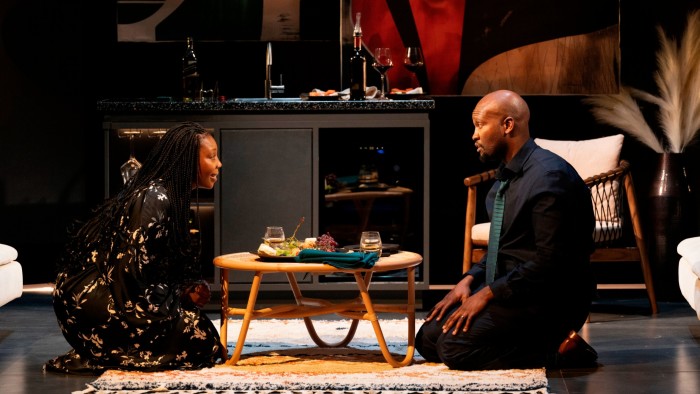Summarize this content to 2000 words in 6 paragraphs in Arabic Unlock the Editor’s Digest for freeRoula Khalaf, Editor of the FT, selects her favourite stories in this weekly newsletter.There’s nothing like property for bringing out the worst in people. And so it proves in Amy Jephta’s caustic satire A Good House. Jephta’s highly enjoyable play has echoes of Lorraine Hansberry’s A Raisin in the Sun, Bruce Norris’s Clybourne Park and Yasmina Reza’s waspish comedies of manners. But, given that Jephta is South African, there’s a particular sting to her funny but merciless unpicking of the intertwining of race and class and her sharp analysis of the way nimbyism can reveal deep-seated prejudices and preconceptions. Here South Africa’s bitter history lurks in every conversation.Like so many domestic comedies, A Good House focuses on a series of social gatherings in which bad faith hangs in the air like persistent damp. First up is a brittle soirée hosted by Sihle (Sifiso Mazibuko) and Bonolo (Mimî M Khayisa), an affluent Black couple who moved into their chic suburban neighbourhood several years previously but are only now enjoying the company of their white neighbours Chris (Scott Sparrow) and Lynette (Olivia Darnley). The sharply observed conversation bristles with assumptions. Sihle explains that he works in securities. “And which security company is that?” asks Chris. Bonolo dispenses wine, painfully slowly, through an aerator, to guests who would clearly rather just knock it back.But the real reason for the neighbourly visit soon spills out. It seems that a little tin shack has suddenly sprung up on an empty plot of land in the community and residents are concerned for their property prices. They’d like Sihle and Bonolo to serve an eviction order on behalf of the neighbourhood. Why? Because they assume the residents of the shack (whom no one has ever seen) are Black and that an approach from the only Black couple in the community will improve the optics. “It always starts with a few sheets of metal,” says Chris, oozing false bonhomie.This ghastly scenario unfolds across several excruciatingly funny conversations. Also party to the debate are a young white couple — Jess, who teaches yoga (Robyn Rainsford), and Andrew, who manages an artisan sandwich shop (Kai Luke Brummer) — who are in over their heads financially and whose house is nearest to the shack. Soon Jephta has worked up a whole cat’s cradle of thorny issues, probing into ownership, belonging, entitlement, the cost and limits of social mobility and the way race and class snake through the arguments.Occasionally, the play becomes a little too diagrammatic, with the characters becoming mouthpieces for points of view. But it’s so smart and tart that it overcomes that, while Nancy Medina’s staging (a co-production with Bristol Old Vic in association with the Market Theatre, Johannesburg) has a slightly surreal edge that gives the action an unpredictable feel. It’s delivered by a super-sharp cast. Khayisa’s Bonolo, initially alert to every microaggression, gradually shifts her position as she realises that signing up to get rid of the shack is what it takes to hang on to her hard-won social standing, while Mazibuko’s Sihle travels in the opposite direction, taking in just how conditional his position is.Meanwhile the shack, designed by ULTZ, just sits there, occasionally mysteriously sprouting an accessory — an extension; a satellite dish; a potted shrub. A silent witness to events, it’s a constant reminder of the inequalities in the country, but also a challenge to everyone in the play and beyond to consider what makes a “good house”, and a symbol of those considered “outsiders” across the world.★★★★☆To February 8, royalcourttheatre.com
رائح الآن
rewrite this title in Arabic A Good House review — an excruciatingly funny satire on race, class and house prices
مال واعمال
مواضيع رائجة
النشرة البريدية
اشترك للحصول على اخر الأخبار لحظة بلحظة الى بريدك الإلكتروني.
© 2026 جلوب تايم لاين. جميع الحقوق محفوظة.









